Bb5.4
Another comparison can be made by searching for the
meanings of the words Metoro was using 16 days after December 31
(365), viz. ko Reha and ko Apareha:
|
Jan 14 |
15 (380) |
16 (365 + 16) |
 |
 |
 |
|
Bb5-6 (590 = 20 *
29½) |
Bb5-7 |
Bb5-8 (171) |
|
kua kake ko
kahini |
kua kake o
manava te kahini |
kua kake ko
Reha - kua kake ko
Apareha |
|
Manava. Abdomen, belly,
(fig.) affection, sensitivity, feelings; manava
more, grief; manava mate, infatuated, in
love (with something); ku-ká-á te manava,
flared up, infuriated, irate; he-kava te manava,
offended, to turn sour, embittered. See also hatu
(manava hatu). Vanaga. Belly, abdomen,
entrails, interior; manava ahuahu,
indigestion; manava hanohano, high tempered,
to annoy; manava itiiti, frugal; manava
karavarava, colic; manava mate, to be in
ecstasy, passion, intensity of affection; manava
more, to desolate; manava ninihi, colic;
manava nuinui, appetite; manava pagaha,
affected, to complain; manava rakerake, bad
character; manava riri, anger; manava ru,
complaint; manava ruru, alarm, consternation,
emotion, swoon; manava tagi, eager; manava
tiha, out of breath; manava topa ki raro,
humble, to humiliate; manava vai, simpleton,
to have dull senses; meniri ko manava, little
finger; kakari manavai, waist; manava eete,
to shudder, to tremble, to astonish; anger, fright,
consternation; manava eete ki te mau mea
ananake, susceptible; eete manava,
affected, moved; manava pohi, hasty, cruel,
penitent; contrition, indignation; kokoma
hanohano manava pohi, to abhor; manava pohi
nunui ke, implacable. P Pau.: manava, the
interior, affected, touched. Mgv.: manava,
the belly, spirit, conscience. Mq.: menava,
respiration, pulse. Ta.: manava, belly,
entrails. Churchill. |
|
RIGHT ASCENSION
DAYS AT THE FULL MOON: |
|
Mash-mashu-arkū-11 (Eastern
One of the Twins)
κ Gemini (116.1),
POLLUX = β Gemini
(116.2), π Gemini (116.9) |
AZMIDISKE (Little Shield) =
ξ
Puppis
(117.4)
*76.0 = *117.4 - *41.4 |
φ
Gemini (118.4)
*77.0 = *118.4 - *41.4 |
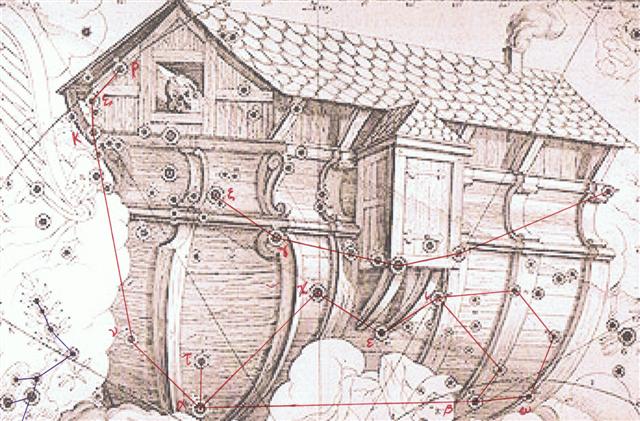 |
|
July 15 (196 =
181 + 15) |
16 |
17 |
Because when reading the A text Metoro seems to have chosen similar words at a similar - although in a way opposite - glyph composition:
 |
 |
 |
 |
 |
 |
 |
|
Aa1-77 |
Aa1-78 |
Aa1-79 |
Aa1-80 |
(54 + 27) |
Aa1-82 |
Aa1-83 → 183 |
|
ma te huega |
e ku inoino |
ma te
tuhuga |
na reho
kuapareho |
te ua roa kua ta i tona e nuku ka ta
e rua |
ki te manu vaero |
|
Hue. To congregate, to
get together; huega, meeting,
reunion of persons, heap,
pile of things; hue hau, ball of string. Huehue, a
fish, with a round body, dark back, and light belly.
Vanaga. 1. Calabash, gourd, pumpkin, pot, vase. P Pau.:
hue, gourd. Mgv.: hue, calabash gourd.
Mq.: hue maoi, calabash; hue ákau,
pumpkin; hue, every sort of vase with a large
aperture. Ta.: hue, gourd, bottle. 2. A pile, a
heap; to accumulate, to agglomerate, to amass, to heap
up, to collect, to charge, to put in charge, to destine,
to consider, to camp, to pile up, to mass, to assemble,
to conceal, to reunite; hue ke, to choose; hue
no, a halt; hue ki ruga, to put on another;
hakahue, to heap up, to amass, to assemble;
huega, mass, sheepfold, camp, collection, company,
society, council, corporation, faculty, crowd, group,
leage. Mgv.: hue, to collect, to gather together,
to heap up. Mq.: huevaevae, calf of the leg;
huefenua, the terrestrial globe. Ta.: hue, to
heap up. Churchill. Pau.: 1. Emotion. Ta.: huehue,
to show fear. 2. To carry, to conduct. Mgv.: akahue,
to carry a crop of foodstuff. Churchill. Mgv.: A fish.
Ta.: huehue, id. Mq.: huehue-kava, id.
Sa.: sue, id. Churchill.
Tahu.
To assist. T Ma.: tahutahu, to attend
upon. Tahuga, pair, to share out, to put in
order, to distribute. Hakatahuga, to put in
pairs, to arrange. P (Metathetic from stem tufa).
Mgv.: tahua, a collection of things properly
classified and kept in order. Mq.: tauna, a
couple. Churchill. Pau.: tahua. 1. Field of
battle. Ta.: tahua, id. 2. Floor. Ta.: tahua,
id. Tahuga, wise, capable, doctor, artisan. Mgv.:
tuhuga, wise, instructed, adroit. Mq.: tuhuna,
wise, instructed, artisan. Sa.: tufuga,
carpenter. Ma.: tohunga, adroit, wise, priest.
Tahutahu, sorcerer. Ta.: tahu, sorcerer.
Mgv.: tahu. 1. A tenant farmer. Ma.: tahu,
opulent, possessing property. 2. To stir up a fire. Ta.:
to build a fire, to light. Mq.: tahu, to light a
fire. Sa.: tafu, id. Ma.: to set on fire, to
kindle, to cook. Tahuna, a shallow, shoal, bank.
Mq.: tahuna, beach gravel, shingle. Sa.:
tafuna, a rocky place in the sea. Ma.: a shoal, a
beach. Tohua, a place of public assembly. Mq.:
tohua, public place, soil, land. Mq.: tahuahi,
the servant in charge of the fire. Ha.: kahuahi,
id. Churchill.Ta.: tahuhu, ridgepole. Ma.:
tahuhu, id. Mgv.: tohuhu, a ridgepole. Mq.:
tohuhu, ridge, roofing. Churchill. Tahua,
sloping stone surface of ahu. Vanaga. T.
Tahua, board,
plank. Tahu'a,
T. Priest, artist. OR. Tahua mimi, bladder.
Fischer.
Ná, here; ná ku-tomo-á te
miro, the boat has arrived here. Vanaga. 1. When, as
soon as (ga). Mgv.: na, because,
seeing that, whereas. 2. The, that, some, any, certain (ga);
pei na, thus, like that. P Mq.: na,
the (plural). Ta.: na, id. 3. Of. P Pau.:
na, of, belonging to. Mgv.: na, of, by, on
account of. Mq.: na, of, by, for, on the part
of. Ta.: na, of, by, for. 4. ? possessive;
na mea, to belong to (? his thing). Mgv.: na,
him, of him, to him. Ta.: na, he, his, him. 5.
(ana 2); i muri oo na, to accompany.
Churchill.
Ho. 1. Ho!, Oh! 2. Lest, on the
point of. 3. To deliver, to give up. Churchill. Ha.
1. Four. 2. To breathe. Hakaha'a, to
flay, to skin. Vanaga. 1. Four. P Mgv., Mq., Ta.:
ha, id. 2. To yawn, to gape. 3. To heat. 4.
Hakaha, to skin, to flay; unahi hakaha, to
scale fish. Mgv.: akaha, to take to pieces, to
take off the bark or skin, to strip the leaves off
sugarcane. 5. Mgv: ha, sacred, prohibited. Mq.:
a, a sacred spot. Sa.: sa, id. Churchill.
Pa.
1. Mgv.: pa, an inclosure, a fenced
place. Ta.: pa, inclosure, fortification. Mq.:
pa, inclosure. Sa.: pa, a wall. Ma.: pa,
a fort. 2. Mgv.: pa, to touch. Sa.: pa'i,
id. Ma.: pa, id. 3. Mgv.: pa, to prattle.
Ta.: hakapapa, to recount. 4. Mq.: pa, a
hook in bonito fishing. Sa.: pa, a pearlshell
fishhook. Ma.: pa, a fishhook. Pau.: hakapa,
to feel, to touch. Mgv.: akapa, to feel, to
touch, to handle cautiously.
Ta. OR. Write, writing. The name
of writing before the term rongorongo in 1871
became current. Fischer. 1. To tattoo ( = tatú),
to tattoo pictures on the skin, also: he-tá ite kona,
tá-kona. 2. To weave (a net): he-tá i te kupega.
3. To shake something, moving it violently up and down
and from one side to the other; he-tá e te tokerau i
te maga miro, the wind shakes the branches of the
trees; also in the iterative form: e-tá-tá-ana e te
tokerau i te tôa, the wind continuously shakes the
leaves of the sugarcane. 4. To pull something up
suddenly, for instance, an eel just caught, dropping it
at once on a stone and killing it: he-tá i te koreha.
Tá-tá-vena-vena, ancient witching formula.
Vanaga. 1. Of. 2. This, which. 3. Primarily to
strike: to sacrifice, to tattoo, to insert, to imprint,
to write, to draw, to copy, to design, to color, to
paint, to plaster, to note, to inscribe, to record, to
describe, number, letter, figure, relation; ta
hakatitika, treaty; ta igoa, sign; ta ki,
secretary; ta kona, to tattoo; ta vanaga,
secretary. Churchill. ... the root ta through its
long series of known combinations carries a strongly
featured sense of action that is peripheral,
centrifugal, and there seems to be at least a suspicion
of the further connotation that the action is exerted
downward ... The secondary sense of cutting will easily
be seen to be a striking with a specialized implement,
and we find this sense stated without recognition of the
primal striking sense only in Mangareva, Nukuoro, Viti,
and Malekula. In Indonesia this secondary sense is
predominant, although Malagasy ta may come
somewhat close to the striking idea ... Churchill 2.
Vaero.
Chicken's long tail feather; lobster's
antenna (vaero ura). Vanaga. Tail of a kite, tail
of a bird (uero). T Pau.: tuavaero, rump;
kaero, tail. Mgv.: vero, tail. Mq.: veó,
id. Ta.: aero, id. Churchill. |
... Ishtar appears on the walls of Uruk
and curses the two heroes who have shamed her, but Enkidu
tears out the right thigh of the Bull of
Heaven and flings it in her face, amidst brutal taunts.
It seems to be part of established procedure in those
circles ...
|
 |
 |
|
Jan 16 (365 + 16) |
Aa1-80
→
2 * 90
= 2 * 59 + 2 * 31 |
|
kua kake ko
Reha - kua kake
ko Apareha |
na reho
kuapareho |
|
Koreha. 1. Sea eel;
several sorts are distinguished: koreha puhi.
haoko, migo, tapatea. 2. Koreha o raro o
te oone, earthworm; koreha henua,
snake. Vanaga. Eel, worm; koreha heenua,
worm. Churchill.
Kapa.
Mgv.: a song for the dead, chant. Mq.:
kapa, a heathen song. Mgv.: aka-kapakapa,
an eager desire balked by timidity. Ta.:
apaapa, to flutter the wings. To.:
kabakaba, id. Ma.: kapakapa, to
flutter. Churchill. Tu.: Kapakapa,
portion, particle. Ta.: apaapaa,
fragment, bit, chip. Churchill. In Polynesia
gliding flight is expressed by lele,
flight on flapping wing by kapa. In
Nuclear Polynesia kapa does not pass into
the wing sense except through the aid of a
composition member kau. In Samoan 'au
we find this to mean a stalk, a handle; in
reference to the body its sense as that of some
projecting member is exhibited in 'aualuma
(the 'au in front) as a very delicate
euphemism for the penis. So 'apa'au would
mean literally the projecting member that flaps.
Churchill 2.
Pare.
Half raw, badly cooked. Parehaoga,
food prepared in the earth oven (umu
parehaoga) for a feast or for people whose
help is needed for some work or for organizing a
feast. Parehe, piece, bit; to fall, break
into pieces. Parei, dirty, to have a
dirty face and eyes, someone who gets up without
washing. Parera, sea bottom. Vanaga. Ta.:
Pare, a fort, a place of refuge. Ma.:
parepare, a breastwork in a stockade. Mgv.:
Pare, a covering for the head. Mq.:
pae, id. Sa.: pale, id. Ma.: pare,
id. Churchill. Parehe, to break, a crack.
Parei, 1. (paré), dressed up. 2. To
sparkle (of the eyes). Parera, 1. A
shallow, a reef. 2. Deep water, profound, gulf;
parera tai, deep sea; tai parera,
high tide; hohonu parera, fathomless,
unsoundable. 3. To lead astray. Hakaparera,
to frighten, to scare. Pareu, skirt,
apron. Mgv., Mq., Ta.: pareu, loincloth,
apron. Pau.: Parego, to drown oneself.
Ta.: paremo, drowned. Ma.: paremo,
id.
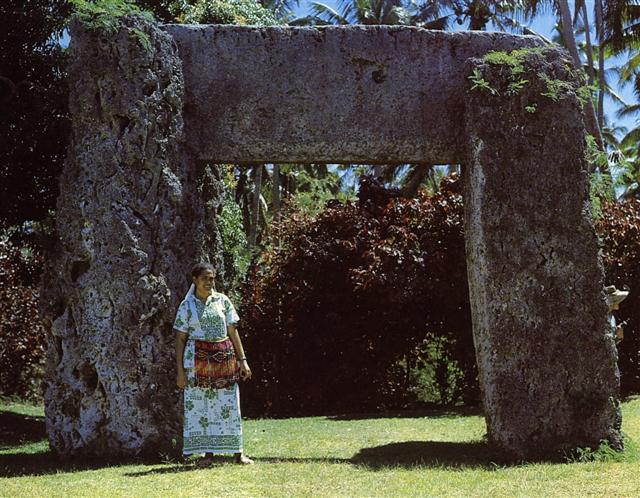
|
Ko Reha was presumably a cautious way to express
for Bishop Jaussen the presence of the koreha creature, the
poweful beast ('worm') who raised the sky roof high:
... In the
beginning there was nothing but the sea, and above
soared the Old-Spider. One day the Old-Spider found a
giant clam, took it up, and tried to find if this object
had any opening, but could find none. She tapped on it,
and as it sounded hollow, she decided it was empty. By
repeating a charm, she opened the two shells and slipped
inside. She could see nothing, because the sun and the
moon did not then exist; and then, she could not stand
up because there was not enough room in the shellfish.
Constantly hunting about she at last found a snail. To
endow it with power she placed it under her arm, lay
down and slept for three days. Then she let it free, and
still hunting about she found another snail bigger than
the first one, and treated it in the same way. Then she
said to the first snail: 'Can you open this room a
little, so that we can sit down?' The snail said it
could, and opened the shell a little. Old-Spider then
took the snail, placed it in the west of the shell, and
made it into the moon. Then there was a little light,
which allowed Old-Spider to see a big worm. At her
request he opened the shell a little wider, and from the
body of the worm flowed a salted sweat which collected
in the lower half-shell and became the sea. Then he
raised the upper half-shell very high, and it became the
sky. Rigi, the worm, exhausted by this great
effort, then died ...
|
Egyptian
cobra in repose |
 |
Phoenician
nūn |
 |
Greek
nu |
Ν (ν) |
|
... Nun is thought to
have come from a pictogram of a snake (the
Hebrew word for snake, nachash begins
with a Nun and snake in Aramaic is nun)
or eel.
Some have hypothesized a
hieroglyph of a fish in water for its origin (in
Arabic,
nūn means large fish or whale). The
Phoenician letter was named
nūn 'fish', but the glyph has been
suggested to descend from a hypothetical
Proto-Canaanite
nahš 'snake', based on the name in
Ethiopic, ultimately from a hieroglyph
representing a snake.
... Nahš in modern Arabic
literally means 'bad luck'. The cognate letter
in Ge'ez and descended Semitic languages of
Ethiopia is nehas, which also means
'brass'. |
|
... This [σ
Sagittarii] has been identified with Nunki
of the Euphratean Tablet of the Thirty Stars,
the Star of the Proclamation of the Sea, this
Sea being the quarter occupied by Aquarius,
Capricornus, Delphinus, Pisces, and Pisces
Australis. It is the same space in the sky that
Aratos designated as Water ...
... I wan't a clean cup, interrupted the Hatter:
let's all move one place on. He moved as he
spoke, and the Dormouse followed him: the March
Hare moved into the Dormouse's place, and Alice
rather unwillingly took the
place of the March Hare. The Hatter was the
only one who got any advantage from the change;
and Alice was a good deal worse off than before,
as the March Hare had just upset the milk-jug
into his plate ...
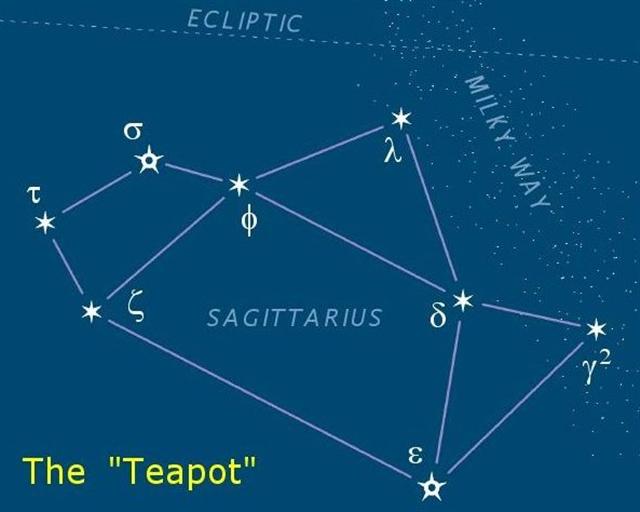
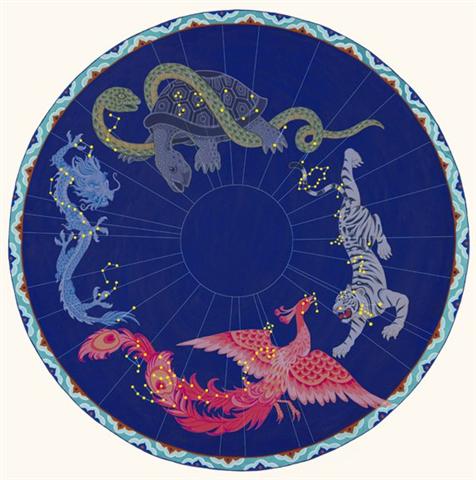 |
... In the deep night before the
image [of Lono] is first seen, there is a
Makahiki ceremony called 'splashing-water' (hi'uwai). Kepelino
tells of sacred chiefs being carried to the water where
the people in their finery are bathing; in the
excitement created by the beauty of their attire, 'one
person was attracted to another, and the result', says
this convert to Catholicism, 'was by no means good' ...
... The life-force of the earth is
water. God moulded the earth with water. Blood too he
made out of water. Even in a stone there is this force,
for there is moisture in everything. But if Nummo is
water, it also produces copper. When the sky is
overcast, the sun's rays may be seen materializing on
the misty horizon. These rays, excreted by the spirits,
are of copper and are light. They are water too, because
they uphold the earth's moisture as it rises ...
|
Matariki i Nika: |
|
The '6
stones' (Tau-ono) - the Pleiades (Mata-riki,
the Small Eyes) - returned to visibility.
Breaking of the Coco-nut. |
Nov 18 (*242)
Hua Tapu
(Welehu) |
10
days |
|
The cycle of Lono
was beginning. |
Nov 28
(332) |
|
Splashing Water (Hi'uwai). Cycle of
Lono completed. |
Dec 20
(354 = 6 * 59)
Makali'i 15 |
 |
|
Kali'i
(Battle of the King). |
Dec 21
(*275 = *242 + 33)
Makali'i 16 |
 |
|
τ AQUILAE |
Makali'i 17 |
 |
|
The
House (Haumea) encircled by
Kahoali'i in the Net of Maoloha.
Lono sacrificed.
Makahiki effigy dismantled and hidden
away.
Eye
swallowed by Death-is-Near,
Koke-na-make = Kahoali'i (Living God,
the Companion of the King). |
December
23 (357)
Makali'i 18 |
 |
|
A
tribute-canoe of offerings to Lono
was set adrift for Kahiki, homeland
of the gods. |
January 16 (365 + 16 = 381) -
December 20 (354 = 6 * 59) = 27
→
'thrice nine hallowed days':
... As has already been mentioned,
the Delphians worshipped Dionysus once a year as the
new-born child, Liknites, 'the Child in the
Harvest Basket', which was a shovel-shaped basket of
rush and osier used as a harvest basket, a cradle, a
manger, and a winnowing-fan for tossing the grain up
into the air against the wind, to separate it from the
chaff. The worship of the Divine Child was established
in Minoan Crete, its most famous early home in Europe.
In 1903, on the site of the temple of Dictaean Zeues -
the Zeus who was yearly born
in Rhea's cave at Dicte near Cnossos, where Pythagoras
spent 'thrice nine hallowed days' of his initiation -
was found a Greek hymn which seems to preserve the
original Minoan formula in which the gypsum-powdered,
sword-dancing Curetes, or tutors, saluted the Child at
his birthday feast. In it he is hailed as 'the Cronian
one' who comes yearly to Dicte mounted on a sow and
escorted by a spirit-throng, and begged for peace and
plenty as a reward for their joyful leaps ...
Bb5-8 (171
→ 144 + 3 * 9 = 9 *
19).
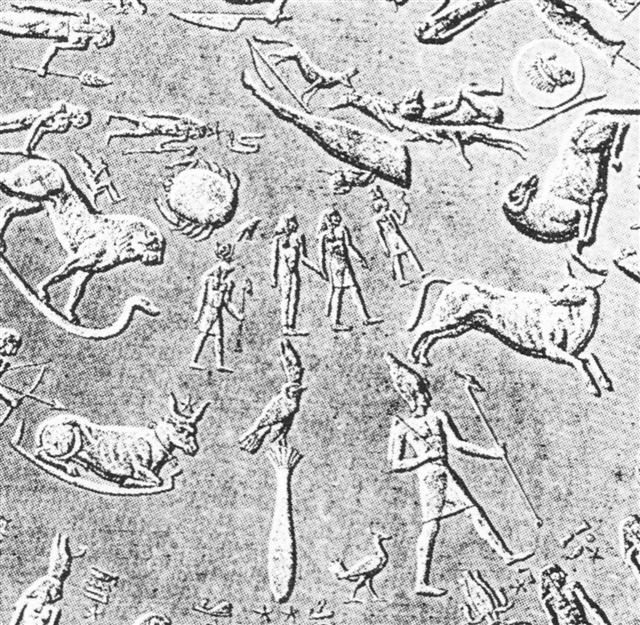
|


















